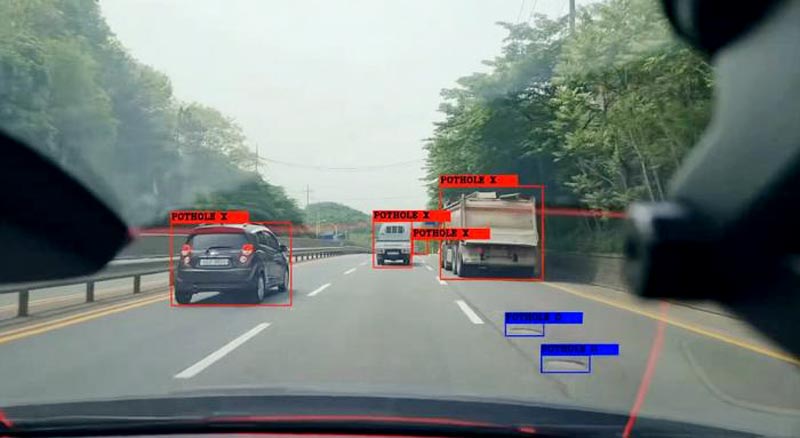
KICT Unveils AI Program for Efficient Pothole Detection

Pothole inspection screen using artificial intelligence pothole filtering program (blue: pothole correct, red: not pothole)
Credit: Korea Institute of Civil Engineering and Building Technology (KICT)
The Korea Institute of Civil Engineering and Building Technology (KICT, President Kim Byung-Suk) has developed a ‘Road Pothole Filtering Program’ to establish an emergency road restoration system for frequent pothole occurrences.
Commonly referred to as ‘the landmine of the road,’ potholes are a road damage phenomenon in which parts of the asphalt sink into bowl-like depressions. Potholes occur when a significant amount of rainwater infiltrates the road surface, weakening the ground below and causing the asphalt pavement to collapse under the weight of passing vehicles.
The occurrence of potholes has increased as abnormal weather phenomena such as heavy rainfall and heavy snowfall, which has spiked due to the recent global warming. Potholes that form on roads cause inconveniences for both vehicular and pedestrian traffic. They also lead to various levels of traffic accidents.
The KICT research team led by Dr. Moonsup, Lee, has developed a new pothole filtering program. The server-based pothole filtering program, which will be added to the Public Data Management System (PDMS), is designed to review primary pothole information detected by the pothole detection program. The pothole detection program, operated by the Land Management Office, under the Ministry of Land, Infrastructure and Transport, is a mobile-based application used for detecting potholes. However, high-specification programs cannot run on mobile devices due to limitations in device performance. As a result, for initially detected pothole information, it is necessary to implement a system that filters out objects resembling potholes, such as shadows, lane markings, and tires.
The research team has developed and trained an artificial intelligence algorithm to exclude objects other than potholes from the primary pothole information transmitted to the server, effectively selecting the real ones. Once the training of the pothole filtering program is complete, it proceeds to inspect the primary pothole information. Its algorithm was designed to use the inspected potholes and other objects as training data for further program enhancement.
Dr. Lee’s research team has established a system using the developed pothole filtering program to automatically transmit verified pothole information to the road maintenance personnel of the Land Management Office every 3 hours.
Dr. Moonsup. Lee, the lead researcher, said, ‘We anticipate that the newly developed system will reduce the processing time of emergency pothole restoration on roads.‘
The Korea Institute of Civil Engineering and Building Technology (KICT) is a government sponsored research institute established to contribute to the development of Korea’s construction industry and national economic growth by developing source and practical technology in the fields of construction and national land management.
The results of the study on the program for pothole detection using artificial intelligence were presented at Maireinfra 2023 (2023.08.16-19), a prominent international conference in the field of infrastructure.












